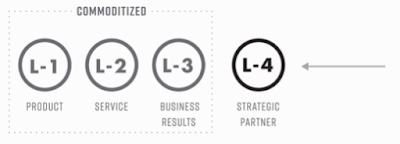"First Principles.Uma ressalva: as empresas não criam valor, as empresas criam ou co-criam valor potencial. Só quando o cliente experiencia valor na sua vida é que ele se materializa.
Value is in the eyes of the beholder—or the recipient, for our purposes here. You have the right to develop a theory as to what should be valuable for another person, but they possess the right to determine their worth. Because perceptions about value vary, you may have to explain why your dream client should perceive the value in the way you view it.
.
The person receiving the value needs to be better off in some way having received it. If the person is no better off having received the attempted value creation, it is not value.
.
Value exists on a continuum. Some things are more valuable than others. My view of this continuum of value in sales is 1: Product Value, 2: Experience Value, 3: Tangible results, and 4: Strategic Value.
.
Value has a contextual component, meaning something that might have been valuable in the past may not be helpful in the future. Something that would be valuable in one circumstance might be less useful when the conditions are different.
.
Value creation tends to degrade over time; it has a half-life. The value you created in the past is not likely to be as valuable to your clients as the value you create now.
.
Value creation may also build on prior value. It is possible to create an upward spiral of higher value over time. [Moi ici: A base para a subida na escala de valor, a base para os macacos que não voam, mas trepam às árvores]
.
The greater the value you create, the more relevant you will be to your clients and your dream clients. An inability to create value will make you irrelevant. [Moi ici: O paradoxo do foco num nicho]
.
Value creation is found in your understanding. It is as much in your learning as it is your teaching. While it is important you help your clients discover something about themselves, it’s equally (or more) important that you allow them to educate you if you want to create a preference."
Relacionar com "Richard von Strigl on Subjective Value":
"The economic value of a good can only be understood as a "subjective value", that is to say, it is always related to and depends upon the effective ends of a determinate economic agent (even though the agent may, of course, take into account the interests of several individuals when setting his ends, as is, for example, the case of a family father)."



%2006.21.jpeg)












